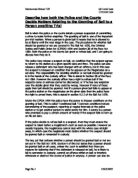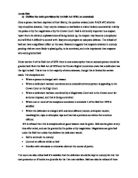The points above are but guides for the courts to use, no amount or rules can take into account all the individual aspects of every case. This must be left to the court. For instance a man may have once not surrendered to bail, which should make him ineligible for bail, however the situation he was in at the time, r is indeed in now may make that fact unimportant.
A great help for the courts is the ability to set conditions. These conditions can take many forms. They are in essence a way, by means of act or barring an act, to ensure the defendant reaches the desired court for instance at the desired time, with no new crimes to his name. these conditions can be various and include the confiscation of defendants passport or being confined to a certain address. Surrendering to police one a day is another example. Sureties are other forms of condition. They are simply the promise from a person connected to the defendant, to pay money to the court, should they fail to surrender to bail at the right time.
The bail system is a complicated one and is basically the conflict between the interests of the presumed innocent defendant and the needs of the public to be protected from potentially dangerous criminals. This juggling act is by no means infallible, but using the criteria stated courts can someone close to the right decision.
In Baldrick’s case the court must look at the facts. He has been accused of stealing a large quantity of turnips. The court must first decide whether bail is allowed. As the crime is one of theft with a maximum penalty of five years it means that he not eligible for definite bail as he has allegedly committed an offence punishable by prison. He has not however committed a serious arrestable offence, so he is entitled to bail if deemed eligible.
The points the court must consider are:
- Will he fail to surrender to bail?
- Will he commit another offence whilst on bail?
- Will he interfere with justice or witnesses whilst on bail?
In deciding whether there is sufficient reason to believe that Baldrick may meet one of the above criteria, the court will look at his past record, to see if he has failed to surrender to bail before, or whether he is likely to commit another crime whilst on bail. They will also look at his character and standing in the community. The strength of evidence against him will also be taken into consideration. With little knowledge of his crime at hand we can only guess at the conclusions the court will make.
2. Theft is a trialable either way offence.
a. Describe how the decision is made as to which court the case is tried in.
The criminal court system as a way of classifying cases s to allocate them the proper court to be tried in. This gives each case an allotment of time and money relative to the crime committed.
There are three classifications for criminal cases. The first and most serious in for indictable offences. These offences include murder, rape, manslaughter and treason. Indictable cases are always tried in the crown court. the second is trialable either way cases. These are cases which can, depending on certain criteria, go to either the indictable route or the summary trial route crimes such as theft and causing grievous bodily harm are in this band. The summary trial is the least serious of the three. These cases are tried in a magistrate’s court and only ever reach the crown court if the magistrates wish to send it up for sentencing.
Now we know the three routes that can be taken we will look at Baldrick’s case.
Having stolen a large quantity of turnips we can say that this case is a trialable either way case. This means that it can be sent to either to the high court or the magistrates’ court. the first stage in deciding which way this case will go is by sending it to the magistrates’ for a plea before venue hearing. This is basically a chance for the defendant to state to the magistrates whether or not they plead guilty. If they submit a guilty plea, then the case is automatically sent to the magistrate’s court. it will then follow that route till it’s conclusion or if found guilty the magistrates have the option of sending it to the crown court for sentencing due to their limited powers for terms of imprisonment. If however the defendant pleads not guilty a different route is followed.
The next step will be a mode of trial procedure must take place. This is to decide where the case will be heard. To decide this a number of factors are to be taken into consideration. The first is whether or not the magistrates themselves are prepared to take the case in their court. To do this they will consult the section 19 ruling of the magistrates’ court act 1980. This basically will mean to look at the seriousness of the case and the punishment the magistrates are able to hand out. They must also take into account anything the prosecution and defence have to say.
Apart from this they have to follow other rules such as that cases involving complex questions of facts or law should go to the crown court as well as these other points.
- Where there was a breach of trust by someone.
- Crime was committed by organised group.
- Where amount involved was twice as much as maximum fine magistrates’ can impose.
The final point is the wish of the defendant. He has a right to state which court he would choose to be tried in though this only has to be followed in special cases. In most cases this is only another consideration the magistrates’ can take into account when deciding if they will accept the case for themselves.
(Not sure if the jury trial is relevant her. Is it still tried in the magistrates’ court regardless?)
all these taken into account it is hard to say which way it will go for Baldrick. He has committed theft on what appears to be a large scale. If he pleads guilty it will be heard in the magistrates though hope he doesn’t get sent to the crown court for sentencing. If however he pleaded not guilty, the magistrates must take into account the above points and decide whether they have the jurisdiction as well as the will to here the case in their court.
B. Discuss the advantages and disadvantages of Baldrick being tried in each court.
If it comes down to Baldrick choosing which court he will be tried in he has an important and possibly helpful or detrimental decision to make.
If Baldrick chose the crown court to hear his case it would be a trial by jury. This basically means that it would not be judge or magistrates’ that would judge his case; it would instead be twelve ordinary members of the public known as a jury. There are many advantages and disadvantage of choosing this mode of trial.
We shall start with the pros of this trial. Firstly the statistics show that a trial by jury is
A better bet for getting off. The figures show that only twenty percent of those defendants that plead not guilty in a magistrates’ court are acquitted, as apposed to sixty percent getting acquitted I a crown court. These percentages appear to give the crown court a definite advantage as far as being acquitted goes. Another big bonus for a trial by jury in the crown court is the time it takes to get to court. this will be much longer than a magistrates’ court and by the time it gets to court witnesses may have forgotten facts or even died. This can lead to weak prosecution cases or even the possibility of no case being put against you. One of the other reasons for those who believe they will be found guilty and are refused bail, they will spend time on remand in a remand prison. This will then be taken off any sentence they receive and a remand prison may indeed be easier than the full prison they will go to later.
All these bonuses of trial by jury are proven and can be very helpful, however, there are some big draw backs to trial by jury in the crown court. one is the cost. The average cost of a trial in the high court is £9000 per day. In a magistrates it is only £1500 per day. Cases will also last a lot longer so costs could go into the tens and even hundreds of thousands. A second big draw back is the sentences given by the crown court if found guilty. These are always much higher than that of the magistrates’ court. The power for higher sentences is also present in the crown court which is not in the magistrates’.
The magistrates court may seem less or indeed more appealing after the above points, but this court too has it’s draw backs and pluses.
It’s bonuses are the much speedier trials and time leading to trial. This is much better if you want to get the case over with quickly. The cost involved is also a lot lower. The prices given above for the cases just show how much cheaper it will be in the magistrate’s court. Another good reason for Baldrick to choose the magistrates’ is the generally lower sentences they impose. This is a real incentive for anyone who feels there is a good chance of being found guilty regardless of which court they are tried in.
The bad points about trial in a magistrates’ are basically the much higher rate of conviction than the crown court. they seem to have a much less open minded view of alleged criminals than the public jury. Reasons for this may be the magistrates’ advanced age. They may be more cynical or indeed more inclined to believe that the police would not have arrested and charged them had they not committed a crime. This is perhaps the mirror of the more sceptical view to the law and police of the jury.
Which ever court Baldrick chooses he is not in for an easy time. He has the worry of either a much higher conviction rate, or a much higher sentence. The only real way to decide is to way up his chances of being found guilty.








